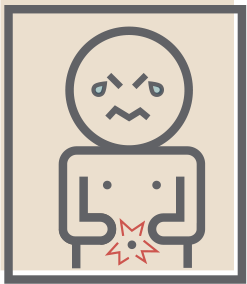Hepatitis C
Also known as - Hep C and HCV
Quick
Facts

It is the most common bloodborne infection in the U.S.
55,000 Philly residents are believed to have hepatitis C.
Over 50% of people living with a hepatitis C are not even aware that they are infected.
People born between 1945-1965 are the most likely to have hepatitis C. Although the number of younger people that are infected is quickly increasing.
There is a cure for hepatitis C.
So, what can you tell me about hepatitis C?
Hepatitis C
Hepatitis C is a virus that infects the liver. It spreads when the blood of an infected person comes into contact with a healthy person’s body fluids. People with hepatitis C do not always have symptoms, so you can live with hep C for a long time and never know it. Understanding your risk and getting tested is important – the earlier you learn your hep C status, the better your chances are of preventing serious liver disease.
Hep C infections can be either acute or chronic
Acute
A mild illness that happens within the first year after infection
Can develop into a chronic infection
20% of adults will be cured of an acute infection without medical help
An estimated 4-10% of infants with HCV positive moms will be infected with hep C during childbirth
People who recover from an acute hep C infection can be infected with hep C again
Chronic
A long term infection that remains in the body for a lifetime
Can result in long term health issues including cancer and death
80% of people exposed to hep C as adults will develop a chronic infection
Up to 3.2 million people in the U.S. might be infected with chronic hepatitis C
Most people who have chronic hepatitis C are not aware that they are infected
How is hepatitis C spread?
Blood
Hepatitis C is spread when blood from a person infected with hep C enters the body or mixes with the blood of an uninfected person.

Can You Guess How
Hepatitis C Is Spread?
SEX
Hmmm....
CHILD BIRTH
Maybe.
DRUG EQUIPMENT
Absolutely.
TOILETRIES
Barely.
HIGH FIVING
Nope.
FRENCH KISSING
Probably not.
BREAST FEEDING
Be careful.
TATTOOS AND PIERCINGS
Definitely.
PLAYING VIDEOGAMES
Safe!
ORGAN TRANSPLANT
It depends...
WORK RELATED EXPOSURE
Yes.
BLOOD TRANSFUSION
Where and when?
Do I have hepatitis C?

You might have Hep C if you...
- Were born between 1945 and 1965
- Have shared needles, cotton, or other items used for injection drugs such as heroin
- Have received a blood transfer or an organ transplant before 1992
- Were tattooed or body pierced at a tattoo party or other unlicensed venues
- Have been exposed to blood at the place where you work
- Have had unprotected sex which could have caused minor internal or external bleeding
- Were born to a mother who has hep C
symptoms are a bit tricky
People who have hepatitis C rarely show symptoms, regardless if it is an acute or chronic infection. The lack of symptoms makes getting tested for hep C much more important. However, it is important to keep in mind that just because symptoms are rare, it doesn’t mean that you won’t get them if you are infected.
Symptoms Include:

the skin or eyes






What If I Think I Have Hepatitis C?
See A Doctor!
If you think you have been exposed to hepatitis C, don’t wait for symptoms to get tested! If you wait until symptoms show up to get tested, your liver may already be damaged beyond repair. Hepatitis is known as a silent killer because it can live in your body for years without you knowing it. So if you think you have been exposed to hepatitis C, tell your medical provider you’d like to be tested.
There Is A Cure!
If you test positive, there are medications that can CURE the virus. You may have heard that hep C treatment has terrible side effects or that you need weekly shots. That was true for a long time, but not anymore! Now is a great time to ask your provider about getting treated.
The new hep C treatment regimens are about 12 weeks long and have minimal side effects compared to the old treatments. In a few years, treatment will be down to one pill a day. The new medications are also curing almost 100% of people who have hep C!
Want to find care or assistance?
Want to get tested for hepatitis? Lack insurance and need assistance? Are you a doctor with a Spanish speaking client who needs translation? No matter your needs, we can help! Check out our Support + Care page to find a place in your community that can give you the healthcare support you deserve.

Where Can I Find More Hep C Info?
Know More Hepatitis is Center for Disease Control campaign aimed at increasing awareness about hep C and encouraging people born during 1945-1965 to get tested. Testing helps identify people who are infected so that they may be able to get lifesaving care and treatment.
Hep Magazine is an online source for educational and social support for people living with hepatitis. The website is devoted to combating the stigma and isolation surrounding hepatitis, and offers news, in-depth reporting, educational tools, care resources, and peer-to-peer networking.
